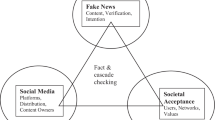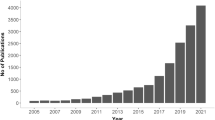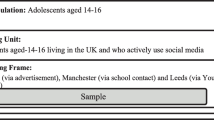Abstract
Background
The Supreme Court of the United States’ (SCOTUS) decision in Dobbs v. Jackson Women’s Health Organization overturned the Court’s previous decision in Roe v. Wade, the case that established abortion before fetal viability as a constitutionally protected right in the USA, thereby returning abortion legality prior to viability back to individual states. Social media reactions indicated strong rebukes of SCOTUS’ actions, potentially indicating support to maintain legal abortion to some extent. Yet, understanding the nuances in public opinion about abortion at the population scale is lacking.
Objective
To measure reactions to overturning Roe v. Wade (an outcome of the Dobbs v. Jackson decision) via social media.
Methods
We applied Latent Dirichlet Allocation (LDA) topic models to generate themes for tweets (N = 4,353,103) collected between 5–3-2022 and 7–6-2022. We then applied a Sentence Bi-directional Encoder from Transformers (S-BERT) analysis with a restricted sample to evaluate daily themes and longitudinal changes. Finally, we applied a sentiment analysis to measure affect and changes in daily posting volume.
Results
Social media reactions to overturning Roe v. Wade were largely negative. LDA and S-BERT topics indicated mostly unease at SCOTUS’ actions and changes to abortion access, though we also observe some support for SCOTUS and its decision. Increased abortion-related social media reactions lasted approximately 7 days before returning to baseline levels.
Discussion and Conclusion
Although initial reactions to overturning Roe v. Wade were in support of abortion, rapid news cycles may have diverted attention away from this monumental issue. Declining coverage about Dobbs, and overturning Roe v. Wade, and by extension social media reactions, holds serious implications for other social issues that will likely be heard before SCOTUS in coming terms. Our findings can inform US abortion climate and promote awareness of the tenuous nature of US social issues and associated rights.




Similar content being viewed by others
Data Availability
Data and source code for this study are available by request via a secure GitHub repository.
References
Anoop, V. S., Prem Sankar, C., Asharaf, S., & Alessandro, Z. (2015). Generating and visualizing topic hierarchies from microblogs: An iterative latent dirichlet allocation approach. Proceedings of the IEEE. https://doi.org/10.1109/ICACCI.2015.7275712
Atske, S. (2021, September 20). News consumption across social media in 2021. Pew Research Center’s Journalism Project. https://www.pewresearch.org/journalism/2021/09/20/news-consumption-across-social-media-in-2021/
Bathina, K. C., ten Thij, M., Lorenzo-Luaces, L., Rutter, L. A., & Bollen, J. (2021a). Individuals with depression express more distorted thinking on social media. Nature Human Behaviour, 1–9. https://doi.org/10.1038/s41562-021-01050-7
Bathina, K. C., ten Thij, M., Valdez, D., Rutter, L. A., & Bollen, J. (2021b). Declining well-being during the COVID-19 pandemic reveals US social inequities. PLoS ONE, 16(7), e0254114. https://doi.org/10.1371/journal.pone.0254114
Beaney, W. M. (1962). The constitutional right to privacy in the supreme court. The Supreme Court Review, 1962, 212–251. https://doi.org/10.1086/scr.1962.3108796
Bench-Capon, T. (2011). Relating values in a series of supreme court decisions. Legal Knowledge and Information Systems, 13–22. https://doi.org/10.3233/978-1-60750-981-3-13
Bento, A. I., Nguyen, T., Wing, C., Lozano-Rojas, F., Ahn, Y.-Y., & Simon, K. (2020). Evidence from internet search data shows information-seeking responses to news of local COVID-19 cases. Proceedings of the National Academy of Sciences, 117(21), 11220–11222. https://doi.org/10.1073/pnas.2005335117
Blei, D. M., Ng, A., & Jordan, M. (2003). Latent Dirichlet allocation. Journal of Machine Learning Research, 3, 30.
Boczkowski, P., Mitchelstein, E., & Matassi, M. (2017). Incidental news: How young people consume news on social media. Hawaii International Conference on System Sciences. https://doi.org/10.24251/HICSS.2017.217
Bollen, J., Goncalves, B., Ruan, G., & Mao, H. (2011). Happiness is assortative in online social networks. Artificial Life, 17(3), 237–251. https://doi.org/10.1162/artl_a_00034
Bowman, K., & Goldstein, S. (2021). Attitudes about abortion: A comprehensive review of polls from the 1970s to today. American Enterprise Institute - AEI. https://www.aei.org/research-products/report/attitudes-about-abortion-a-comprehensive-review-of-polls-from-the-1970s-to-today/
Bruce, T. C. (2020). Efficacy, distancing, and reconciling: religion and race in Americans’ abortion attitudes. Religions, 11(9), 475.
Castillo, C., El-Haddad, M., Pfeffer, J., & Stempeck, M. (2014). Characterizing the life cycle of online news stories using social media reactions. Proceedings of the 17th ACM Conference on Computer Supported Cooperative Work & Social Computing, 211–223. https://doi.org/10.1145/2531602.2531623
Cohen, I. G., Reingold, R. B., & Gostin, L. O. (2022). Supreme court ruling on the Texas Abortion Law: Beginning to unravel Roe v Wade. JAMA, 327(7), 621–622. https://doi.org/10.1001/jama.2022.0050
Colditz, J. B., Chu, K.-H., Emery, S. L., Larkin, C. R., James, A. E., Welling, J., & Primack, B. A. (2018). Toward real-time infoveillance of Twitter health messages. American Journal of Public Health, 108(8), 1009–1014. https://doi.org/10.2105/AJPH.2018.304497
Crawford, B. L., Jozkowski, K. N., Turner, R. C., & Lo, W.-J. (2021). Examining the relationship between Roe v. Wade knowledge and sentiment across political party and abortion identity. Sexuality Research and Social Policy. https://doi.org/10.1007/s13178-021-00597-4
Edinger, A., Valdez, D., Walsh-Buhi, E., & Bollen, J. (2022). Deep learning for topical trend discovery in online discourse about Pre-Exposure Prophylaxis (PrEP). AIDS and Behavior. https://doi.org/10.1007/s10461-022-03779-2
Edo-Osagie, O., De La Iglesia, B., Lake, I., & Edeghere, O. (2020). A scoping review of the use of Twitter for public health research. Computers in Biology and Medicine, 122, 103770. https://doi.org/10.1016/j.compbiomed.2020.103770
Ettinger, A. (2020). What BERT is not: Lessons from a new suite of psycholinguistic diagnostics for language models. Transactions of the Association for Computational Linguistics, 8, 34–48. https://doi.org/10.1162/tacl_a_00298
Foster, M. (2022). An exploration of the wide-reaching effects of the repeal of Roe v. Wade on women’s access to abortion. University Honors Theses. https://doi.org/10.15760/honors.1224
Garrow, D. J. (2015). Liberty and sexuality: The right to privacy and the making of Roe v. Wade. Open Road Media.
Gerstein, M., & Ward, A. (n.d.). Exclusive: Supreme Court has voted to overturn abortion rights, draft opinion shows. POLITICO. Retrieved July 24, 2022, from https://www.politico.com/news/2022/05/02/supreme-court-abortion-draft-opinion-00029473
Gore, R. J., Diallo, S., & Padilla, J. (2015). You are what you tweet: Connecting the geographic variation in America’s obesity rate to twitter content. PLoS ONE, 10(9), e0133505. https://doi.org/10.1371/journal.pone.0133505
Grishman, R. (1986). Computational linguistics: An introduction. Cambridge University Press.
Grootendorst, M. (2022). BERTopic: Neural topic modeling with a class-based TF-IDF procedure (arXiv:2203.05794). arXiv. https://doi.org/10.48550/arXiv.2203.05794
Guandong, X. (2013). Social media mining and social network analysis: Emerging research: Emerging Research. IGI Global.
Guttmacher Institute. (2023). State bans on abortion throughout pregnancy. Guttmacher Institute. https://www.guttmacher.org/state-policy/explore/state-policies-later-abortions
Hans, J. D., & Kimberly, C. (2014). Abortion attitudes in context: A multidimensional vignette approach. Social Science Research, 48, 145–156. https://doi.org/10.1016/j.ssresearch.2014.06.001
John, D. M. (1987). Pro-life and pro-choice mobilization: Infrastructure deficits and new technologies. In Social Movements in an Organizational Society.
Jozkowski, K. N., Bueno, X., Turner, R. C., Crawford, B. L., & Lo, W.-J. (2023a). People’s knowledge of and attitudes toward abortion laws before and after the Dobbs v. Jackson decision. Sexual and Reproductive Health Matters, 31(1), 2233794. https://doi.org/10.1080/26410397.2023.2233794
Jozkowski, K. N., Crawford, B. L., & Hunt, M. E. (2018). Complexity in attitudes toward abortion access: Results from two studies. Sexuality Research and Social Policy, 15(4), 464–482. https://doi.org/10.1007/s13178-018-0322-4
Jozkowski, K. N., Crawford, B. L., & Willis, M. (2021). Abortion complexity scores from 1972 to 2018: A cross-sectional time-series analysis using data from the General Social Survey. Sexuality Research and Social Policy, 18(1), 13–26. https://doi.org/10.1007/s13178-020-00439-9
Jozkowski, K. N., Crawford, B. L., Simmons, M. K., Turner, R. C., & Lo, W.-J. (2023b). Predictors of engagement in abortion-related activism before and after the nomination of supreme court justice Brett Kavanaugh. Sexuality Research and Social Policy, 1–22.
Jozkowski, K. N., Crawford, B. L., Turner, R. C., & Lo, W.-J. (2020). Knowledge and sentiments of Roe v. Wade in the wake of justice Kavanaugh’s nomination to the U.S. supreme court. Sexuality Research and Social Policy, 17(2), 285–300. https://doi.org/10.1007/s13178-019-00392-2
Jozkowski, K. N., LaRoche, K. L., Crawford, B. L., Jackson, F., Turner, R. C., & Lo, W. J. (2021). Because I understand both sides: Exploring attitudes of US adults who simultaneously identify as pro-life and pro-choice. Contraception, 104(4), 452. https://doi.org/10.1016/j.contraception.2021.07.017
Li, X., Bing, L., Zhang, W., & Lam, W. (2019). Exploiting BERT for end-to-end aspect-based sentiment analysis (arXiv:1910.00883). arXiv. https://doi.org/10.48550/arXiv.1910.00883
Library of Congress. (n.d.). U.S. Reports: Roe v. Wade, 410 U.S. 113 (1973). [Image]. Library of Congress, Washington, D.C. 20540 USA. Retrieved September 5, 2022, from https://www.loc.gov/item/usrep410113/
Martini, F., Samula, P., Keller, T. R., & Klinger, U. (2021). Bot, or not? Comparing three methods for detecting social bots in five political discourses. Big Data & Society, 8(2), 20539517211033570. https://doi.org/10.1177/20539517211033566
Mississippi Legislature. (2017). HB1510 (As Sent to Governor)—2017 Regular Session. Bill Status US. http://billstatus.ls.state.ms.us/documents/2017/html/HB/1500-1599/HB1510SG.htm
Mississippi Legislature. (2018). HB1510 (As Sent to Governor)—2018 Regular Session. Bill Status US. Retrieved October 23, 2023, from http://billstatus.ls.state.ms.us/documents/2018/html/HB/1500-1599/HB1510SG.htm
Nasteski, V. (2017). An overview of the supervised machine learning methods. HORIZONS.B, 4, 51–62. https://doi.org/10.20544/HORIZONS.B.04.1.17.P05
Newman, N. (2011). Mainstream media and the distribution of news in the age of social media. https://ora.ox.ac.uk/objects/uuid:94164da6-9150-4938-8996-badfdef6b507
Padilla, J. J., Kavak, H., Lynch, C. J., Gore, R. J., & Diallo, S. Y. (2018). Temporal and spatiotemporal investigation of tourist attraction visit sentiment on Twitter. PLoS ONE, 13(6), e0198857. https://doi.org/10.1371/journal.pone.0198857
Patton, D. U., Frey, W. R., & Gaskell, M. (2019). Guns on social media: Complex interpretations of gun images posted by Chicago youth. Palgrave Communications, 5(1), 1. https://doi.org/10.1057/s41599-019-0330-x
Pickett, A. C., Valdez, D., & Barry, A. E. (2019). Measurement implications associated with refinement of sexual and gender identity survey items: A case study of the National College Health Assessment. Journal of American College Health, 1–7. https://doi.org/10.1080/07448481.2019.1598421
Poliak, A., Satybaldiyeva, N., Strathdee, S. A., Leas, E. C., Rao, R., Smith, D., & Ayers, J. W. (2022). Internet searches for abortion medications following the leaked supreme court of the United States draft ruling. JAMA Internal Medicine. https://doi.org/10.1001/jamainternmed.2022.2998
Public Opinion on Abortion. (2022). Pew research center’s religion & public life project. https://www.pewresearch.org/religion/fact-sheet/public-opinion-on-abortion/
Rosenberg, H., & Feldman, C. S. (2008). No time to think: The menace of media speed and the 24-hour news cycle. A&C Black.
Roshanzamir, A., Aghajan, H., & Soleymani Baghshah, M. (2021). Transformer-based deep neural network language models for Alzheimer’s disease risk assessment from targeted speech. BMC Medical Informatics and Decision Making, 21(1), 92. https://doi.org/10.1186/s12911-021-01456-3
Sagan, P., & Leighton, T. (2010). The Internet & the future of news. Daedalus, 139(2), 119–125. https://doi.org/10.1162/daed.2010.139.2.119
Shahsavari, S., Holur, P., Wang, T., Tangherlini, T. R., & Roychowdhury, V. (2020). Conspiracy in the time of corona: Automatic detection of emerging COVID-19 conspiracy theories in social media and the news. Journal of Computational Social Science, 3(2), 279–317. https://doi.org/10.1007/s42001-020-00086-5
Siegel, S. A. (1991). Lochner era jurisprudence and the American constitutional tradition. North Carolina Law Review, 70, 1.
Taylor, J., & Pagliari, C. (2018). Mining social media data: How are research sponsors and researchers addressing the ethical challenges? Research Ethics, 14(2), 1–39. https://doi.org/10.1177/1747016117738559
Valdez, D., Jozkowski, K. N., Haus, K., ten Thij, M., Crawford, B. L., Montenegro, M. S., Lo, W.-J., Turner, R. C., & Bollen, J. (2022). Assessing rigid modes of thinking in self-declared abortion ideology: Natural language processing insights from an online pilot qualitative study on abortion attitudes. Pilot and Feasibility Studies, 8(1), 127. https://doi.org/10.1186/s40814-022-01078-0
Valdez, D., Picket, A. C., Young, B.-R., & Golden, S. (2021). On mining words: The utility of topic models in health education research and practice. Health Promotion Practice, 22(3), 309–312. https://doi.org/10.1177/1524839921999050
Valdez, D., ten Thij, M., Bathina, K., Rutter, L. A., & Bollen, J. (2020). Social media insights into US mental health during the COVID-19 pandemic: Longitudinal analysis of twitter data. Journal of Medical Internet Research, 22(12), e21418. https://doi.org/10.2196/21418
Valdez, J. (2018). Bias in public health research: Ethical implications and objective assessment tools [Thesis]. https://oaktrust.library.tamu.edu/handle/1969.1/174067
Vlachos, A. (2011). Evaluating unsupervised learning for natural language processing tasks. Proceedings of the First Workshop on Unsupervised Learning in NLP, 35–42. https://aclanthology.org/W11-2205
Watson, K. (2018). Scarlet A: The ethics, law, and politics of ordinary abortion. Oxford University Press.
What conservative justices said about Roe at their confirmation hearings. (2022). Washington Post. Retrieved July 24, 2022, from https://www.washingtonpost.com/politics/2022/06/24/justices-roe-confirmation-hearings/
Zaki, N. D., Hashim, N. Y., Mohialden, Y. M., Mohammed, M. A., Sutikno, T., & Ali, A. H. (2020). A real-time big data sentiment analysis for iraqi tweets using spark streaming. Bulletin of Electrical Engineering and Informatics, 9(4), 4. https://doi.org/10.11591/eei.v9i4.1897
Funding
There is no funding associated with this study.
Author information
Authors and Affiliations
Corresponding author
Ethics declarations
Competing Interests
The authors have no conflicts of interest to disclose.
Additional information
Publisher's Note
Springer Nature remains neutral with regard to jurisdictional claims in published maps and institutional affiliations.
Rights and permissions
Springer Nature or its licensor (e.g. a society or other partner) holds exclusive rights to this article under a publishing agreement with the author(s) or other rightsholder(s); author self-archiving of the accepted manuscript version of this article is solely governed by the terms of such publishing agreement and applicable law.
About this article
Cite this article
Valdez, D., Mena-Meléndez, L., Crawford, B.L. et al. Online Social Media Reactions to the Overturn of Roe v. Wade: Public Health Implications and Policy Insights. Sex Res Soc Policy (2023). https://doi.org/10.1007/s13178-023-00892-2
Accepted:
Published:
DOI: https://doi.org/10.1007/s13178-023-00892-2




